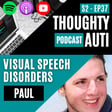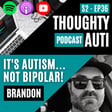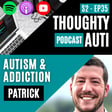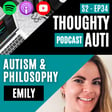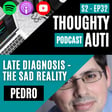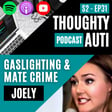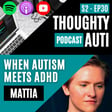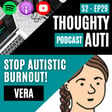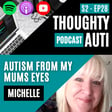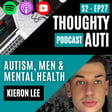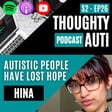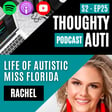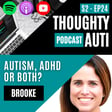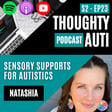
Fixing Autism Sleep Issues
Why do autistic people struggle with sleep? Do autistic people have a different sleep cycle? How can we fix autism sleep issues?
In this episode of the Thoughty Auti Podcast, Thomas Henley talks to Dr. Megan Neff from Neurodivergent Insights about the sleep issues autistic people face and how to fix them.
Thomas’s Links: https://linktr.ee/thomashenleyUK
Megan Neffs Links: https://linkin.bio/neurodivergent_insights/
Chapters:
00:00 - 01:10 Introduction
01:10 - 04:09 Catch Up With Megan
04:09 - 5:03 Alexithymia In Therapy
05:03 - 09:00 The Importance Of Sleep
09:00 - 21:31 Autistic Issues with Sleep
21:31 - 34:29 Autistic Strategies To Fix Sleep
34:29 - 40:42 The Vagus Nerve & Breathing Techniques (Q&A)
40:42 - Pain, Sleep and CBi Therapy (Q&A)
42:04 - 45:07 Sleep Supplements (Q&A)
45:07 - 46:37 Conclusion
Song Of The Day (Listen Here) - https://open.spotify.com/playlist/5UDIyN5TSYN4zMcRoQPrG8?si=9255ed3480d840b5 Subscribe to the channel to get notified when I next go live 🙌
🗣️ My Socials and Podcast - https://linktr.ee/thomashenleyUK
🐰 My Favourite Energy Drink Powder (with L-Theanine) - https://affiliates.sneakenergy.com/s/thomashenleyuk
💻 My Amazon Store Recommendations (Sensory items, gym gear, YouTube set-up) - https://www.amazon.co.uk/shop/thomashenleyuk
🎧 Dbud Noise Cancelling Adjustable Ear Buds (20% Off with code: THOUGHTYAUTI) - https://dbud.io/bntvs5
◽️◽️◽️◽️◽️◽️
WHAT SERVICES DO I OFFER?
🎙️ Podcast, TV and Radio Guest
🗣️ Public Speaking For Events
📸 Neurodiverse Modeling (Contact for details)
📧 CONTACT: https://www.thomashenley.co.uk (hi@thomashenley.co.uk)
◽️◽️◽️◽️◽️◽️
FOLLOW MY SOCIALS ♥:
Instagram - @thomashenleyuk
TikTok - @thomashenleyuk
Facebook - Thomas Henley
Twitter - @thomashenleyuk
Linkedin - Thomas Henley
All my links: https://linktr.ee/thomashenleyuk





